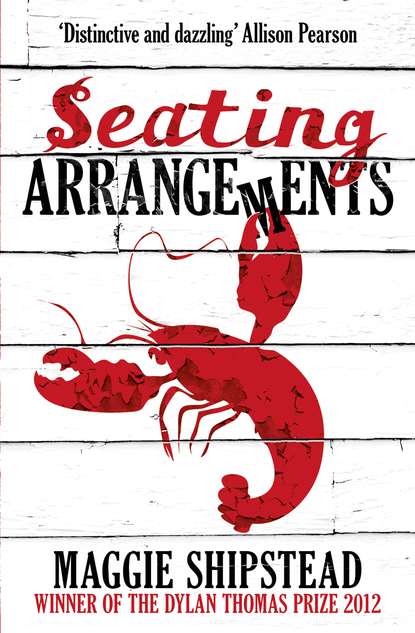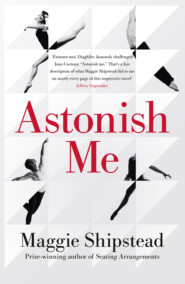По всем вопросам обращайтесь на: info@litportal.ru
(©) 2003-2025.
✖
Seating Arrangements
Автор
Год написания книги
2018
Настройки чтения
Размер шрифта
Высота строк
Поля
“What do you say we take the scenic route?” Winn said, pausing at the road.
She shrugged. “I thought we were in a hurry.”
Only to get out of the house, he thought. In the hour since his arrival, he had managed to offend Biddy by suggesting that all the test runs with makeup and hair and such were an extravagance and also to walk in on Agatha in the downstairs bathroom. He hadn’t seen anything, only her surprised face and bare thighs (the gauzy white dress concealed their crux) and a wad of toilet paper clutched in her hand, nor had he said anything, which made the situation worse. He had closed the door—not slammed it but closed it quietly and deliberately—before fleeing up to the widow’s walk to tell Biddy he was going to the market.
The day was warm and unusually still. Split-rail fences and a thickety layer of brush hemmed in the road. The interior of the island was occupied mostly by scrublands called the Moors, low hills with sharp, rusty vegetation and bony, crooked trees, like a piece of the Serengeti delivered to the wrong address. On the ocean side, shingled houses were scattered among scrub pines, cranberry bogs, and marshes. They drove past the undulating, sand-trapped meadow belonging to the Pequod Golf Club, its ovoid greens marching off like footprints left by an elephant. Distant golfers bent and flexed, launching unseen balls into the blue air.
“Heard anything about the Pequod?” Livia asked.
“No, not yet,” Winn said, trying to sound cheerful. “I’ll have to call up Jack Fenn and get the latest.”
Livia let her head tip back until she was staring up at the Rover’s ceiling. “Would it be so bad not to join? You already belong to a thousand clubs. You hardly even go to half of them. I don’t see why belonging to the Pequod is so essential.”
“It’s not essential. Nothing is essential. I think we’ll all enjoy the membership, that’s all.”
“Can you leave the Fenns out of it at least?”
“Unfortunately, no. Look, they’re not my favorites, either, but Fenn and I go back long before you and Teddy were even born. We have a relationship that has nothing to do with you.”
“Not to mention Fee,” Livia said snidely, referring to Jack’s wife, Teddy’s mother, who was an ex-girlfriend of Winn’s.
“Ancient history,” said Winn. As a consequence of its selectivity, his world was sometimes too small. “No need to bring it up. Nothing to do with the Pequod.”
“No one besides you even golfs,” Livia said to the ceiling.
“There’s a gym there, and a bar. They have nice events—dances, silent auctions, theme parties. You’ll like it.”
She let her head roll in his direction. “I do love silent auctions.”
“Don’t be sarcastic, Livia. It isn’t ladylike.”
For three summers Winn had languished on a secrecy-shrouded wait list for membership in the Pequod. For three summers he had kept bitter evening vigils on the widow’s walk, staring out at what he could see of the course from the house: only a scrap of the tenth hole, but that bit of grass was the gateway to a verdant male haven and confessional. In the decades he had been coming to the island, he had always thought of membership as something obtainable but deliberately left for later. So it was to his bafflement that he had pulled all available strings and schmoozed all relevant parties, including the Fenns, and still he found himself relegated to guest status. He had an excellent track record with clubs. Though no club could equal the pleasures of his college club, the Ophidian—a brotherhood of such importance that he wrote one Christmas newsletter exclusively for its members and another for the remainder of the Van Meter family’s acquaintance—he had joined other clubs, in New York and in Boston, one in London, all places where he could drop in for dinner and feel welcome and sit in a leather chair and read newspapers hinged on long wooden sticks. He belonged to more specialized clubs, too, for the purposes of swimming or golf or racquet sports, and none had ever hesitated to accept him as a member. But Jack Fenn was on the Pequod’s membership committee and Fee Fenn was on the social committee, and, truth be told, Winn never knew where he stood with them, if bygones were bygones or not.
To change the mood, he reached over and patted Livia’s bony knee. “So,” he said, playing jolly, “the big day!”
“It’s not my big day.”
“Don’t be sour. Your day will come.”
She moved her leg irritably, and the flowers trembled. “I wouldn’t mind if everyone would stop telling me that. I’ll either get married or I won’t. I’m not jealous. I’m looking forward to this weekend being over. End of story.”
“That’s not quite the spirit, Livia.” Yearn as he might for the end of the wedding hoopla, Winn knew he must ride in front of the troops, sword raised, toward a successful event. “Especially from the maid of honor. You’re in charge of honor.”
He meant it as a joke, but she said, grimly, “I thought you weren’t impressed with my honor.”
He refrained from answering. They passed a marshy pond crowded with cattails and bulrushes.
“Look at the egret,” she said
Winn glimpsed a tall, slender shape and a flash of white wings. “It’s a heron,” he said.
“No, it’s an egret. Egrets are white. Herons aren’t.”
“Well,” said Winn in a voice that signaled he was being kind but not sincere. “All right.”
In town, the traffic was slow, and without a breeze the car was warm. Livia shifted the flowers, and some greenery tickled Winn’s hand. He pushed it away. Livia sighed and rested her elbow on the window’s edge. “All these people. Too many people.”
“Hopefully they’re not all wedding guests,” he said.
She snorted. “Do you have any idea what it’s like to share a room with Celeste?”
“I think I can imagine.”
“After the lights are out, I hear ice cubes rattling around. Then she tries to get me to girl talk with her and whispers questions about my love life until she falls asleep, which is when she starts snoring. You can’t imagine. She sounds like someone trying to vacuum up a mud puddle.”
Many times in the past, over holidays or vacation weekends, Winn had been kept awake by Celeste’s industrial rumble from several rooms away, but he said, “Buck up, pal. I’d appreciate if you’d contribute by being nice to your aunt.”
“I contribute. I contribute in lots of ways. I’m the maid of honor. I’m a servant to the pregnant queen. Why do I also have to be a companion to the drunken aunt?”
“Celeste has had some rough breaks along the way. The charitable thing would be to cut her some slack.”
“She’s a gargoyle.”
“She’s a ruin.”
“Of her own making. I can’t get away from her. She’s everywhere with her martinis and her stories. She’s like, ‘Roomie, did I tell you about the time my third husband ran off to Bolivia with my best friend’s daughter? You don’t know heartbreak until your third husband has run off to Bolivia with your best friend’s daughter.’ That clink-clink, clink-clink, clink-clink that lets you know she’s coming—it’s like the shark music in Jaws.”
“Be thankful you weren’t around for that divorce, the Bolivian one. That was a dogfight.”
“I don’t think a divorce that happened twenty-something years ago is an excuse for her to be a complete mess.”
“What do you propose we do?” Winn said. “Should we put her in a burlap sack and push her off the ferry?”
“The sack is probably overkill.”
“If she wants to get drunk and say the wrong thing, then that’s what she’s going to do. And as much as we’d like for her not to exist, she does. Death, taxes, and family, Livia.”
THE FARM might have been the end of the earth. A thin seam of ocean sealed its fields to the sky, all of it coppered by the sun. The water’s surface, choppy and striated with light, was beautiful, but Livia liked to think about what was teeming underneath: phytoplankton, of course, stripers, bluefish, bonito, maybe tuna, certainly fish larvae and fry, worms and mollusks in the sea floor. Pelicans diving to fill up their huge mouths. Seals. Perhaps a whale, although they were rare around Waskeke. In previous centuries, the islanders had hunted sperm whales and right whales almost to extinction, and Livia suspected the animals still picked up bad vibes from the surrounding waters.
The older she got, the more claustrophobic she felt within her family. Her father’s desire to join clubs had once seemed perfectly normal but now struck her as grasping and embarrassing. He seemed to believe his various clubhouses, stuffy old buildings full of stuffy old people, were bunkers that would shelter him from the fallout of ordinary life, protect him like the green fence out in the yard was supposed to keep his precious vegetables safe from the menacing deer. Teddy had felt a similar skepticism about his own family, and she had imagined that together they could forge a new freedom, make lives of their own, but then he had left her, an outcome she could not accept. She kept turning the breakup around and around in her mind like a Rubik’s cube, unable to puzzle out what had driven him off. She had never been so happy as she was with him. He had been happy, too—she was sure of it.
“For Christ’s sake,” her father said, waiting for an old lady to maneuver her Cadillac out of a parking space in the market’s gravel lot.
The market building, towering over a clump of greenhouses, resembled an enormous, gray-shingled schoolhouse. Livia got out first and walked ahead. Inside, the market was airy and cool and smelled of field dirt, tomatoes, cold meat, and cellophane. Her father caught up with her, peering over his glasses at a list he’d written on a napkin. “Corn, tomatoes, lettuce, I brought cocktail onions from home, we need pickles, we’ll get shrimp at the seafood place, we’ll get smoked salmon at the seafood place, something-not-shellfish for Dicky, lobsters are being delivered, then bread, cheese, et cetera, et cetera. You get the corn first, please, Livia.”
“How much?”
“We’ve got seventeen for dinner, so why don’t you get twenty ears.”







